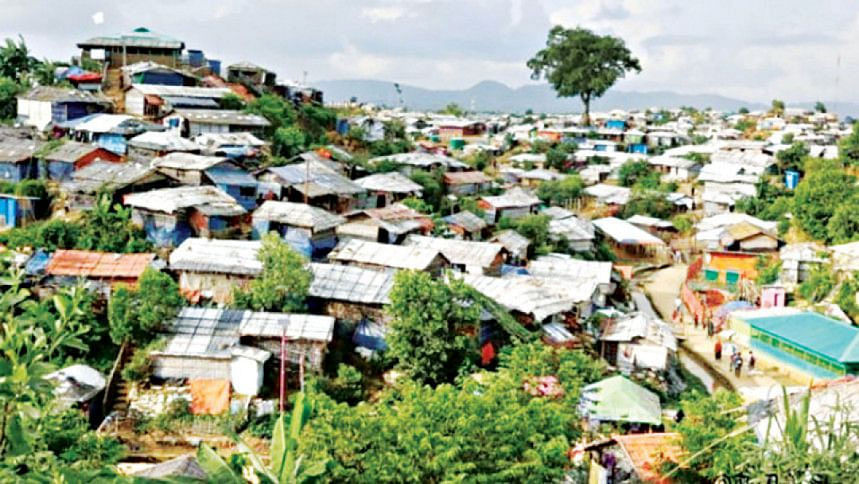Rohingyas hit by US fund cuts

Trump administration's executive order to suspend US-funded projects and funding globally has started hitting the Rohingya camps in Bangladesh, which is sheltering more than a million Rohingya and taking the brunt in its fullest form for decades.
Though the emergency food delivery by the World Food Programme, supported by the US, continues in the Rohingya camps in Ukhia and Teknaf, the health sector, waste management and site management are already being impacted.
At least five hospitals run with US funding have suspended operations in the Rohingya camps, Mizanur Rahman, the Refugee, Relief and Repatriation commissioner, told The Daily Star yesterday.
Besides, waste management and landfill activities, managed by a large Bangladeshi non-governmental organisation, have also been suspended a day after the USAID letter was issued on January 24.
The USAID memo asked the implementing partners to stop work right away, saying that "no further assistance shall be disbursed in a manner that is not fully aligned with the foreign policy of the President of the United States".
The US also withdrew from the World Health Organisation (WHO) and the Paris Climate Pact.
The Trump administration is reviewing all the US funds and projects for 90 days before any final decision.
Already, the development professionals in Bangladesh working on nearly 100 projects for which $450 million was disbursed last year are facing troubles.
They have either been asked not to go to the office or work from home, but actually have no work.
However, there was a sense that the Rohingya camps would not be hampered due to the executive order of the US, which determined in 2022 that the atrocities against the Rohingya were genocide and committed support for accountability of the Myanmar junta.
Officials concerned have raised serious concerns over the fact that the US is the largest donor for the Rohingya humanitarian response and that the foreign aid for the Rohingya has been declining over the last years amid other conflicts in other parts of the world.
According to the UN, out of a total $852.4 million requirement for the Rohingya in 2024, the US provided $301 million or 55 percent of the total $548.9 million provided by foreign donors last year.
Some of the major NGOs operating in the Rohingya camps include BRAC, the International Rescue Committee, Save the Children, CARE Bangladesh and UN agencies.
The WHO and GAVI provide critical medical care including vaccination among the Rohingya, the majority of whom are women and children.
"It is a matter of serious concern if the US government stops funding for the WHO and GAVI as they provide the life-saving vaccines," Rahman said.
The suspension of many hospitals means limited access to healthcare for the Rohingya, especially emergency care.
"This will definitely create pressure on other hospitals and healthcare quality will deteriorate," Rahman said.
However, the US during the previous tenure of Donald Trump continued to provide humanitarian assistance to the Rohingya.
"We are optimistic that the US government will do the same this time too," Rahman added.
The Rohingya facilities are inadequate for the more than a million refugees, said Khin Maung, coordinator for Refugee Youth in Bangladesh, a Rohingya organisation in the Cox's Bazar camp.
"If the funding from the US is cut or declines, it will have huge impacts on us. We appeal to the US government to continue the funding for the sake of humanity."

 For all latest news, follow The Daily Star's Google News channel.
For all latest news, follow The Daily Star's Google News channel. 



Comments